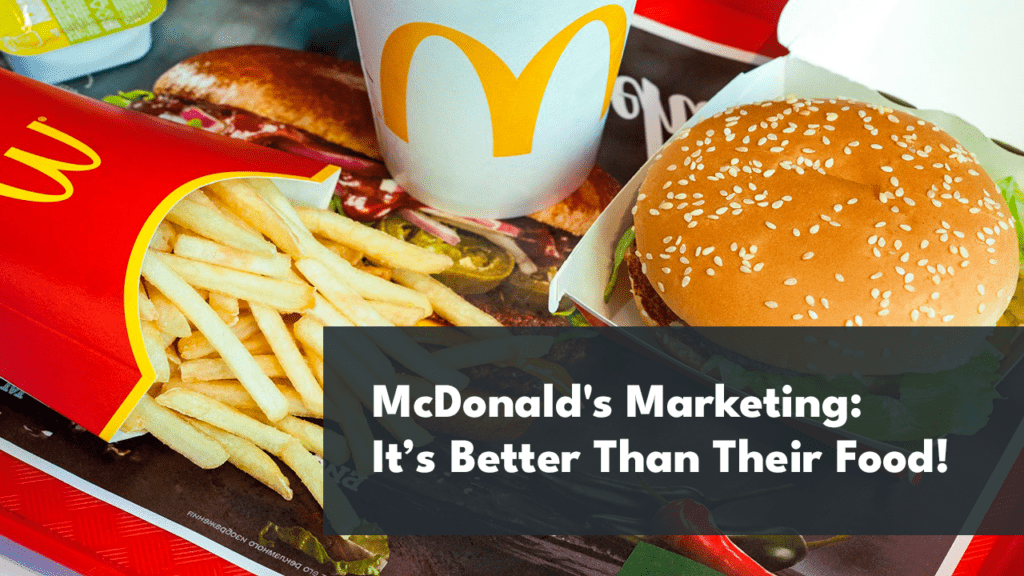Before we go any further, let me start by saying – we’re not knocking the food, it’s just their marketing is really, really good.
It has to be, to stay in business that long, to face that many competitors, and to get dragged through the mud on occasion (we all remember the video that showcased their nuggets as pink slime). Still, they continue to shine as one of our most popular fast food joints, even restaurants. This article is going to explore why – and how.
A BIT ABOUT MCDONALDS
Just about everybody around the world would recognize the golden arches, just as we all recognize the smell of those french fries from a mile away. So we don’t really need to detail their history, which dates back to 1940, when they were founded. Still, even though they’re so familiar, it can be unbelievable to realize that they’re in 118 Countries, specifically with:
- 13,371 outlets in the U.S.A.
- 3,500 in China
- 2,900 in Japan
- 1,500 in France
- 1,438 in Germany
- 1,400 in Canada
- …and thousands of others across the globe.
THE STATUS QUO BIAS
A number of studies have demonstrated that consumers tend to stick with “preset” options and decisions they’ve made in the past. This remains true regardless of the options offered. In fact, when faced with a large number of options, a person is even more likely to turn to an old, familiar favorite as opposed to trying something new. We do this to reduce the danger of buyer’s remorse, even if it is just a burger.
McDonald’s has an unusually widespread presence in modern life, with many of us developing a pattern of ordering behavior over time (from Happy Meals to hangover cures). This poses a unique and underappreciated issue for McDonald’s reinvention: how do you break individuals out of their decades-long purchase habits?
Fortunately, that’s not a problem McDonald’s needs to worry about. Their competitors do though. It’s incredibly interesting to know the impact our safe choices have on the economy and to see how important psychology is to buying behavior.
MCDONALD’S USING PSYCHOLOGY TO THEIR FAVOR
When it comes down to it, the buyer and the seller are the two main stakeholders in the market economy. The two parties communicate through a market exchange relationship. They assess and identify trade-offs that they must make to achieve their individual goals. Policies and objectives guide the seller, such as a profit margin.
On the other hand, the buyers – namely, us, the consumers – have policies and objectives that drive the end of their transaction. It’s much easier for buyers to govern their choice to purchase than it is for a seller’s choice to make the sale.
This imbalance exposes businesses to a “black box” of customer behaviors, making the exchange process unpredictable and difficult for marketers. However, an organization like McDonald’s has the resources to dive into psychological factors that influence the consumer’s decision, including motivation, perception, and personality.
1. MOTIVATION:
McDonald’s is currently working to repair its tarnished reputation as a provider of unhealthy foods. To keep clients motivated, the company offers a variety of dishes that appear healthier, such as salads and smoothies. Furthermore, the organization inspires its customers by providing lower-cost foods in order to shine the light on its economical benefits, not its unhealthiness. In addition, the company offers “quick” cuisine for individuals on the go, guaranteeing the customer is well-fed in the shortest amount of time possible.
Various philosophies address the concept of motivation. Abraham Maslow’s Hierarchy of Needs is the most well-known. According to this notion, human needs are organized hierarchically, from the most basic to the most advanced. For many, cheaper food is more important than healthy food.
2. PERCEPTION:
You can see from the above example how perception plays a large part in the decision-making process. A consumer who has worked hard to save for retirement has plenty of money in the bank because he saves in areas such as lunch expenses. However, he’s older now, has high cholesterol, and has switched to Subway as his “go-to” choice because it’s known for having less fat and more vegetables.
Individuals are driven to purchase or not purchase a product in this scenario based on their perceptions of their wants as well as their perception of products they believe can meet those needs. Buyers subconsciously evaluate their wants, values, and expectations in response to stimuli such as a billboard on the highway with a mouthwatering picture of a Big Mac. The importance of a brand’s or industry’s perception is founded on this understanding. As a result, it can’t be overlooked. Businesses must make every effort to guarantee that their products have a favorable public reputation.
3. PERSONALITY:
Personality refers to a person’s characteristics that distinguish them from others. It is impossible for two people to share the same characteristics. As a result, each person’s personality has an impact on their decision to buy something. Sigmund Freud classified people into two personality types: introverts and extroverts. The introvert is self-directed and does not connect with others too much. Extroverts, on the other hand, are outgoing, goal-oriented, maybe even forceful. The two people react to marketing efforts in different ways.
As a fast-food company, McDonald’s caters to a wide range of personalities. It takes advantage of scale economies by selling to people of various ages. This strategy is maintained by promoting the organization as convenient and quick to serve all clients. The human traits that a firm and its services can be associated with are referred to as brand personality. McDonald’s, for example, places a premium on being well-located and dependable to its consumers. As a result, it never fails to provide customers with the foods they’ve been craving.
When you look back on the history of the brand, you can see where McDonald’s wins and loses with their marketing campaigns. There are certainly a lot more wins, which is why McDonald’s grew from being a single restaurant run by two brothers to a global empire built on happy customers, speedy service, and really, really good french fries.
If you’re looking to motivate your audience in the same manner that McDonald’s has (and really, what business owner isn’t), then we’d like to invite you to book an appointment today to start uncovering what your audience really wants from you.

